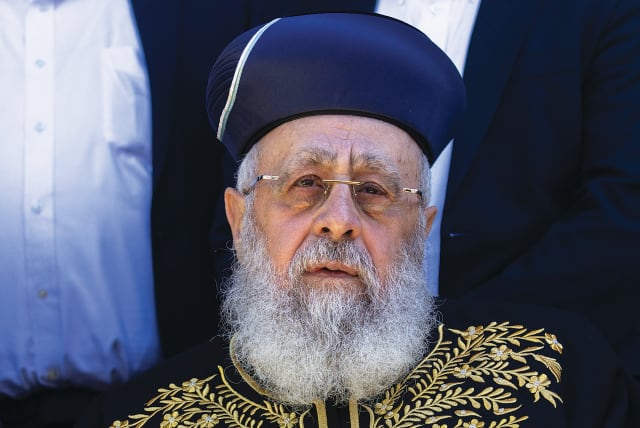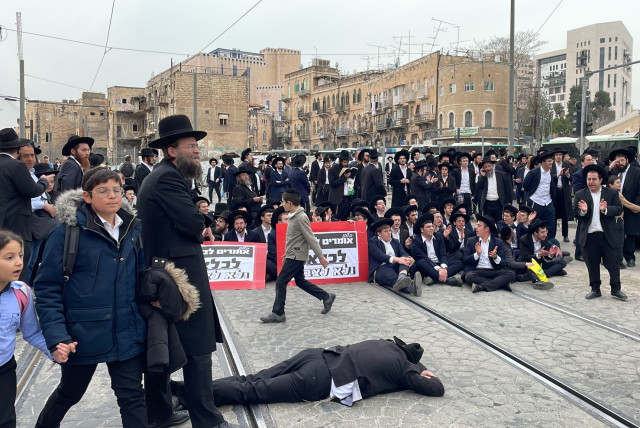Sephardi Chief Rabbi Yosef's words are an insult to IDF soldiers risking their lives - editorial

The threat of a mass departure by the haredim may not be an empty threat and it should not be acceptable.
Sephardi Chief Rabbi Yitzhak Yosef stirred controversy by threatening a mass exodus, if the government enforces compulsory military service for the haredim (ultra-Orthodox Jews).
Yosef asserted that, if forced to join the army, haredim would collectively move abroad, posing a potential upheaval for the nation.
Needless to say, this is a horrible thing to say. Israel’s defense equates Israel’s existence, and the rabbi’s comments not only reject that fact, they insult those who strive to defend their country, both in mandatory service and the reserves.
“Rabbi Yosef’s words are an insult and disgrace to the IDF soldiers who risk their lives to defend the country,” Opposition Leader Yair Lapid said. “Yosef is employed and paid by the state. He cannot threaten the state.”
Yosef, in his comments, underscored the pivotal role of Torah study in Israel’s success, attributing the country’s achievements to divine protection secured through Torah learning, rather than military might alone.
This, if anything, is an insult to soldiers who have fought, especially now, amid war, to ensure the safety of Israel’s citizens, secular and ultra-Orthodox alike.
We do not presume to know the will of God, but neither should Yosef, especially when it comes to the protection of our sacred land.
The spiritual contributions of haredim
Yosef also questioned the secular community’s appreciation for the spiritual contributions to national security, highlighting the perceived undervaluation of the yeshivas and kollels.
He suggested, as many men of faith have before him, that Israel’s value is derived solely from their faith, completely negating any virtues beyond of Judaism, whether directly in defense of the state or by character alone.
Yosef’s comments echo sentiments previously expressed within the haredi community by his late father, former chief rabbi Ovadia Yosef, suggesting in 2013 that haredim might leave if compelled to serve.
This occurred in the context of an ongoing debate about conscription, a divisive issue in Israeli society.In late February, the High Court of Justice issued conditional orders challenging the government’s policies on drafting haredi religious students.
The orders demand that the government annul by March 24 a decision not to enlist yeshiva students, until a new law was enacted by March 31. Additionally, on March 24, the government must explain its failure to recruit students.The court further demands an explanation by March 31 for the Education Ministry’s continued funding of Torah institutions despite students’ military service not being legally deferred.
IDF Chief of Staff Lt.-Gen. Herzi Halevi criticized the exemption of haredim from national service several times last week. He emphasized the importance of broadening the sectors of Israel’s population serving in the military and performing national service.
He argued that this inclusivity is necessary to replace fallen soldiers and stressed that national unity would be sustained only if all segments of the population, including haredim, participate in military or national service.
Milhemet mitzvah, defined as “War by Commandment” in Hebrew, refers to wars commanded by the Torah that Israel’s kings could initiate without needing Sanhedrin approval, typically for fulfilling divine commandments, such as battles against the arch enemy, Amalek. In contrast, milkhemet reshut, or “authorized war,” required Sanhedrin permission and was usually for territorial expansion or economic gain, unlike milhemet mitzvah, which was often defensive or for protecting vital interests.
There is no doubt that the defense of the Jewish people in the world’s only Jewish state is a milhemet mitzvah. Hundreds of soldiers, from all backgrounds, have sacrificed their lives during this righteous war. Haredi leaders should ignore politics and be a part of the broader nation of Israel, in fighting for its survival.
The threat of a mass departure by the haredim may not be an empty threat and it should not be acceptable. It raises important questions about religious freedom and national security in the State of Israel.
Ultimately, however, there is only one side of this debate threatening to leave the country if asked to serve. If the threats are false, it is an cruel gesture. If they are real, they have misinterpreted the word of God.
Jerusalem Post Store
`; document.getElementById("linkPremium").innerHTML = cont; var divWithLink = document.getElementById("premium-link"); if (divWithLink !== null && divWithLink !== 'undefined') { divWithLink.style.border = "solid 1px #cb0f3e"; divWithLink.style.textAlign = "center"; divWithLink.style.marginBottom = "15px"; divWithLink.style.marginTop = "15px"; divWithLink.style.width = "100%"; divWithLink.style.backgroundColor = "#122952"; divWithLink.style.color = "#ffffff"; divWithLink.style.lineHeight = "1.5"; } } (function (v, i) { });

